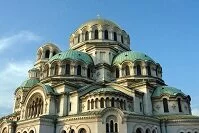Most of the Turks and Roma speak their native languages, as some learn Bulgarian, but in many communities few people learn these languages. English and other popular international languages are growing in popularity in Bulgaria, but few people speak these languages at the present.
Religion

Alexander Nevsky Cathedral
Most ethnic Bulgarians are Bulgarian Orthodox while the Turkish minority tends to be Muslim.
Orthodoxy is a Christian religion that claims to be the most loyal to the Christian faith and religion as it was described by Jesus and the Gospels in the New Testament. Christianity, including Orthodoxy, was founded after the death of Jesus in about 30-33 AD; various branches of Orthodoxy were officially recognized by governments long before Catholicism was recognized in the Roman Empire.
Orthodoxy and Catholicism have many of the same beliefs; both believe that there is a single God who created everything and a savior, the son of God, Jesus Christ who is the forgiver of sins. However, Orthodoxy is decentralized so each bishop oversees their local country or region, giving each orthodox country a different leader. In this way, no bishop has more power than any other, meaning the tenants and interpretations of the faith remain relatively unchanged. These beliefs are based on the teachings of the Bible, consisting of the Old and New Testaments, in particular the life and teachings of Jesus, which is found in the gospels (in the New Testament).